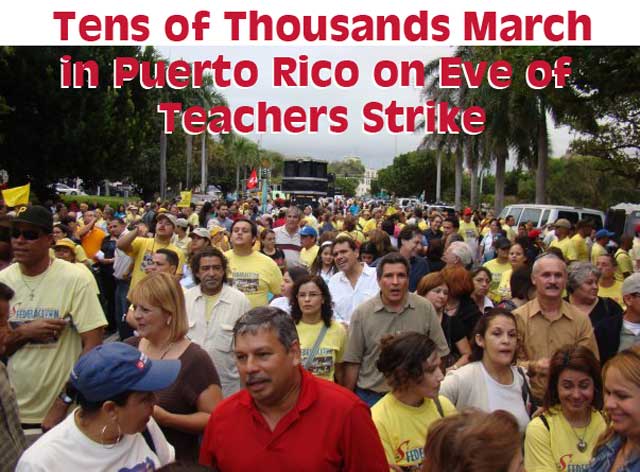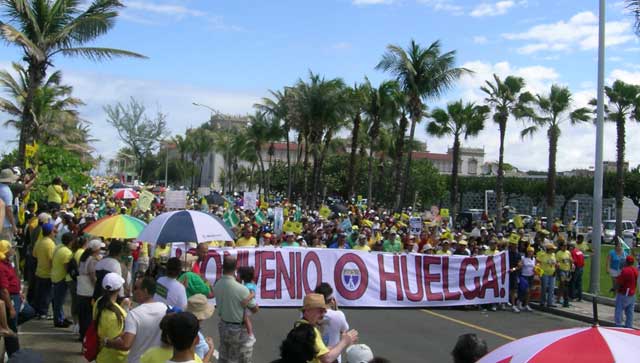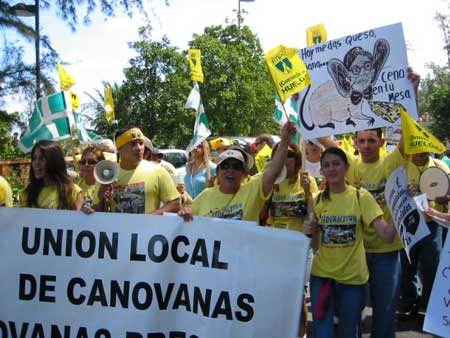
Don’t Let Writers Stand Alone – All Media Workers Should Join the WGA on Strike!
(December 2007).
click on photo for article

Militant Protest Against Racist Cop
Attack on Bay Area Longshore Workers (October 2007).
click
on photo for article
February 2008

SAN
JUAN, February 17 – “La huelga va, la huelga va” (the strike is
on the
way), sang thousands of teachers as they marched through the streets of
Puerto
Rico’s capital today in preparation for the massive strike that is
shaping up
as a major class battle.
After
more than 27 months in negotiations and two years without a contract,
faced
with the arrogant intransigence of the anti-labor governor and his
wildly
unpopular Education Secretary Rafael Aragunde, the teachers shook walls
and
windows of the colonial capital with their chants of “Lucha
sí, entrega no”
(Struggle yes, sellout no) and “La huelga en educación sera
la mejor lección”
(The education strike will be the best lesson of all).
Leaders
of the Puerto Rican Teachers Federation (FMPR) had expected a turnout
of about 15,000, equivalent to a little over
a third of the union’s island-wide membership. Instead, 30,000 or more
marchers
turned out, overwhelmingly teachers but including contingents from the
powerful
electrical workers’ (UTIER) and water workers’ (UIA) unions – both
currently in
contract negotiations.
Unionists
from hospitals, universities, bottling plants and other sectors,
students and
activists turned out to support the teachers. Bus after bus pulled into
the
rally site, filled with FMPR unionists and supporters from cities,
towns and
rural areas all over the island, bedecked with union flags and slogans
proudly
proclaiming that they are “en pie de lucha” (on battle footing)
and
ready to strike.
The
teachers are in strikingly high spirits given the threats they face
from a
union-busting, privatizing government that treats them with utter
contempt.
Proclaiming in one chant after another their “militancia,” their
mood
was combative, determined, yet infectiously upbeat. Teachers danced to
newly
composed salsa songs about the coming strike that blasted from union
sound
trucks. Impromptu groups gathered to sing improvised lyrics against the
government.

Puerto Rican
teachers march, Sunday, February 17. FMPR banner says, “Contract
or Strike!”
Stickers
and printed posters declared “The Strike Teaches You How to Defend Your
Rights,” “Charter Schools = Profit and Privatization,” “Rights We Have
Won Will
Never Be Surrendered,” and many other slogans. Hand-decorated placards
showed
rats, sewage and other examples of miserable conditions in the schools.
Millions
of dollars sent by the federal government for immigrant education
programs have
disappeared. Before that, millions more were sent to pay for
non-existent
charter schools. A cab driver recalled that former Education Secretary
Víctor
Fajardo received a 12-year prison sentence in 2002 when it came out
that over
$4 million had been embezzled from the school system. But still the
corruption
goes on.
 Message to Education
Secretary Aragunde: “We Teachers Are To Be Respected.”
Message to Education
Secretary Aragunde: “We Teachers Are To Be Respected.”
(Photo: El Internacionalista)
While
salaries are shockingly low, teachers often state that money is not the
main
issue, at the same time as they denounce Aragunde’s “attempt to buy us
off”
with last-minute lump-sum payments. Last October’s order that teachers
“punch
in” at the beginning and end of the school day and lunch breaks, using
a
digital scanner, has evoked blistering outrage: “We’re treated like
criminals
and forced to stand in line up to twenty minutes, four times a day.”
The
government is trying to force up class sizes, while the teachers are
fighting
to reduce them, in order to give students individual attention.
“Bonuses”
(merit pay) for schools where students’ average grades are higher is
another
hot issue. So too is the Education Department’s arbitrary dissolution
of
in-school committees where teachers have traditionally worked out
issues of
curriculum and other vital questions. These are replaced by
cookie-cutter
“plans” from government officials indifferent (at best) to students’
needs.
The
drive to establish a thousand charter schools as part of the
(international)
campaign to privatize education is rightly seen as an issue of life or
death
for the democratic right to education.
Above
all, “Teachers Demand Respect,” as innumerable T-shirts and signs
proclaimed.
Protesters voiced outrage at the government’s attempt to strip them of
union
representation, decertify and bust their union and reduce them to
submission.
Unionists have stated in no uncertain terms that their picket lines will
be respected.
As we often have cause to note: Picket lines mean don’t cross!
The
government also has taken a hard line with the UTIER and UIA unions,
which like
the FMPR have leftist leadership and a history of combativeness. Last
week, the
Electrical Energy Agency postponed negotiations, and the Water Agency
simply
dismissed the UIA’s demands. The government is acting as if it wants to
provoke
a showdown. If so, then darles duro (playing hardball) will be
a
question of survival for the unions.
The
teachers union is the largest on the island, and precisely for that
reason
leaving the teachers to face the government onslaught alone could have
serious
results for all labor. The need to generalize a teachers strike
into an
island-wide shutdown may soon be posed. Some left groups toss
around the
“general strike” slogan in a ritual way, yet a one- or two-day holiday
and
march can mean just blowing off steam, as opposed to a struggle over
power. But
power is what decides the outcome when the most basic class issues are
posed.
Business
unionists, particularly those connected with the AFL-CIO and “Change to
Win”
federations, fear such a battle like the plague. They have already sold
their
services to the governor by attacking the FMPR for calling for a
strike. But
thousands of combative trade-unionists react with indignation against
this backstabbing.
This is a vital battle where reputations for militancy will be tested,
and
backing down could be extremely costly. In a hard strike, a fighting
“triple
alliance” of the FMPR, UTIER and UIA could be key to winning.
Several
chants and songs included references to “la huelga general,” and
in
conversation many teachers talked about the general strike of 1998. Yet
that
strike was defeated because the labor leadership was not prepared to
fight the
colonial government politically. As teachers repeatedly point out, this
is a
struggle for the rights and needs of all working people. Mobilizing the
power
of all labor will be crucial if the government seeks to break the
strike
through large-scale arrests, scabherding and other acts of repression.
Key
dangers to the struggle are encapsulated in one of the slogans chanted
during
the march: “The people united will never be defeated.” This may seem
like
nothing but a vague, feel-good sentiment for all occasions, but it
comes from
Salvador Allende’s Chilean “Popular Unity” coalition based on “unity”
with
bourgeois politicians and “constitutionalist” military officers like
Augusto
Pinochet, leading to bloody defeat in Pinochet’s coup of September
1973.
At
today’s march the gubernatorial candidate of the bourgeois Puerto Rican
Independence Party (PIP) was ostentatiously in the front line. Not
coincidentally, the PIP sound truck – bedecked with election posters –
repeatedly blasted the “People United” slogan. A telephone worker
buying the El
Internacionalista supplement said: “It bothers me that these guys
from the
PIP are using the teachers’ struggle to put forward their politics.”
 FMPR delegation from Canovanas, with green
and white flags of the PIP behind them.
FMPR delegation from Canovanas, with green
and white flags of the PIP behind them.
(Photo: El Internacionalista)
The
Movimiento Socialista de Trabajadores (MST), a “democratic socialist”
(i.e.,
social-democratic) group whose members play a leading role in the
teachers,
electrical workers and other unions, does not draw a sharp class line
against
bourgeois forces like the PIP. The MST, in line with its
advocacy of a “conception of unity” of the “independentista movement,”
has frequently
been in blocs with the PIP.
Yet
illusions in “unity” with “progressive,” “autonomist” and
independentista capitalist politicians
were key to the collapse of the 1998 general strike, which shut down
the island
only to be sold out by labor leaders after two days (see our article
“Balance
Sheet of the General Strike: Puerto Rican Workers Mobilize, Union Tops
Cave
In,” The Internationalist No. 6, November-December 1998).
Defeating
the offensive of the bosses, their apparatus of state repression and
their fake
“labor leader” accomplices requires defeating capitalist politics. It’s
necessary to break with the bourgeois parties and begin building a
workers
party on a program of class struggle vs. class collaboration. Marchers
bought
hundreds of copies of the El Internacionalista supplement,
which
presents a revolutionary program for waging the struggle in the
perspective of
a fight for a workers and peasants government that would seek to spread
socialist revolution internationally.
Teachers,
as well as student leftists and many other activists, were eager to
hear of the
resolutions for mobilizations in solidarity with the FMPR that sections
of the
League for the Fourth International have obtained from education
workers
(including striking university unionists) in Brazil and Mexico.
Internationalist Group supporters told of our fight in U.S. unions to
build
solidarity for the Puerto Rican teachers.
The
militancy demonstrated today and the sharpness of the looming class
confrontation are indications of the real potential for a revolutionary
workers
party in Puerto Rico based on the program of permanent revolution and
working-class internationalism.
If la huelga va, it will be a major
test of wills, of forces,
and of
program for the classes in struggle in Puerto Rico, with lessons for
working
people internationally. As one of the FMPR slogans aptly puts it: “LA
LUCHA
EDUCA” (Struggle educates). Victory to the Puerto Rican
teachers! n
See
also: A
Case of Labor Colonialism: AFL-CIO & CTW vs. the FMPR (7
February 2008)
Puerto
Rico: All Out
to Defend the Teachers’ Struggle! (14
February 2008)